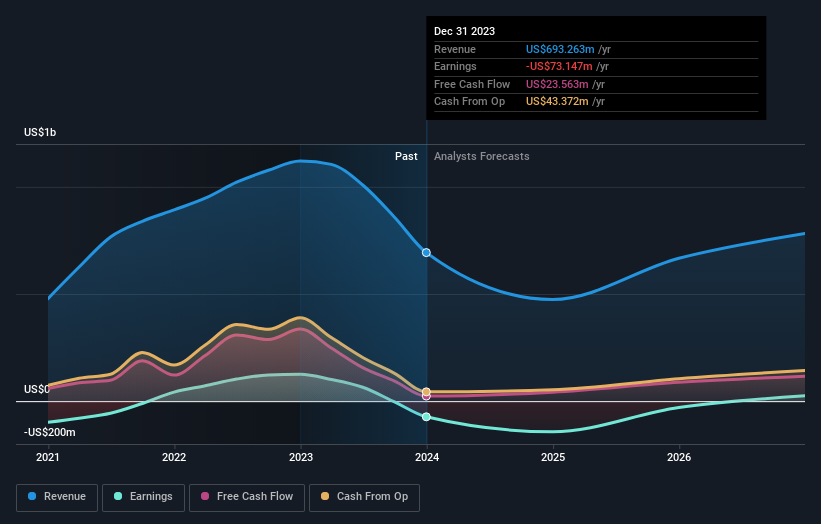Stock Analysis
- United States
- /
- Semiconductors
- /
- NasdaqGS:MXL
MaxLinear (NASDAQ:MXL) adds US$319m to market cap in the past 7 days, though investors from three years ago are still down 36%

This week we saw the MaxLinear, Inc. (NASDAQ:MXL) share price climb by 19%. But that cannot eclipse the less-than-impressive returns over the last three years. Truth be told the share price declined 36% in three years and that return, Dear Reader, falls short of what you could have got from passive investing with an index fund.
On a more encouraging note the company has added US$319m to its market cap in just the last 7 days, so let's see if we can determine what's driven the three-year loss for shareholders.
Check out our latest analysis for MaxLinear
MaxLinear wasn't profitable in the last twelve months, it is unlikely we'll see a strong correlation between its share price and its earnings per share (EPS). Arguably revenue is our next best option. When a company doesn't make profits, we'd generally hope to see good revenue growth. That's because fast revenue growth can be easily extrapolated to forecast profits, often of considerable size.
Over three years, MaxLinear grew revenue at 12% per year. That's a pretty good rate of top-line growth. Shareholders have seen the share price fall at 11% per year, for three years. This implies the market had higher expectations of MaxLinear. However, that's in the past now, and it's the future is more important - and the future looks brighter (based on revenue, anyway).
The graphic below depicts how earnings and revenue have changed over time (unveil the exact values by clicking on the image).

MaxLinear is a well known stock, with plenty of analyst coverage, suggesting some visibility into future growth. So it makes a lot of sense to check out what analysts think MaxLinear will earn in the future (free analyst consensus estimates)
A Different Perspective
While the broader market gained around 28% in the last year, MaxLinear shareholders lost 34%. Even the share prices of good stocks drop sometimes, but we want to see improvements in the fundamental metrics of a business, before getting too interested. Unfortunately, last year's performance may indicate unresolved challenges, given that it was worse than the annualised loss of 3% over the last half decade. We realise that Baron Rothschild has said investors should "buy when there is blood on the streets", but we caution that investors should first be sure they are buying a high quality business. It's always interesting to track share price performance over the longer term. But to understand MaxLinear better, we need to consider many other factors. For example, we've discovered 2 warning signs for MaxLinear that you should be aware of before investing here.
But note: MaxLinear may not be the best stock to buy. So take a peek at this free list of interesting companies with past earnings growth (and further growth forecast).
Please note, the market returns quoted in this article reflect the market weighted average returns of stocks that currently trade on American exchanges.
Valuation is complex, but we're helping make it simple.
Find out whether MaxLinear is potentially over or undervalued by checking out our comprehensive analysis, which includes fair value estimates, risks and warnings, dividends, insider transactions and financial health.
View the Free AnalysisHave feedback on this article? Concerned about the content? Get in touch with us directly. Alternatively, email editorial-team (at) simplywallst.com.
This article by Simply Wall St is general in nature. We provide commentary based on historical data and analyst forecasts only using an unbiased methodology and our articles are not intended to be financial advice. It does not constitute a recommendation to buy or sell any stock, and does not take account of your objectives, or your financial situation. We aim to bring you long-term focused analysis driven by fundamental data. Note that our analysis may not factor in the latest price-sensitive company announcements or qualitative material. Simply Wall St has no position in any stocks mentioned.
About NasdaqGS:MXL
MaxLinear
MaxLinear, Inc. provides communications systems-on-chip solutions worldwide.
Undervalued with adequate balance sheet.

